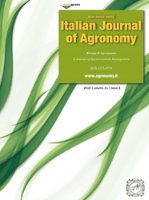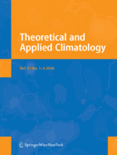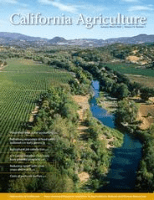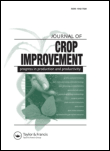
Italian Journal of Agrometeorology-Rivista Italiana di Agrometeorologia
Scope & Guideline
Bridging Meteorology and Agriculture for Tomorrow’s Challenges
Introduction
Aims and Scopes
- Climate Impact on Agriculture:
The journal extensively covers research on how various climate factors, such as temperature and precipitation, affect agricultural productivity, crop yield, and quality. - Water Management Strategies:
It addresses innovative irrigation techniques and water resource management, emphasizing sustainable practices to improve water use efficiency in agriculture. - Crop Adaptation and Resilience:
Research focuses on how different crops adapt to changing climatic conditions, including studies on phenology, yield responses, and stress tolerance. - Technological Innovations:
The journal includes studies on the application of technology, such as artificial intelligence and remote sensing, to monitor and predict agricultural outcomes. - Agrometeorological Modeling:
It features research that develops and applies models to simulate the interactions between weather patterns and agricultural systems, aiding in decision-making processes.
Trending and Emerging
- Climate Change Adaptation Strategies:
There is an increasing emphasis on understanding how agricultural systems can adapt to climate change, showcased by studies on crop resilience and adaptive management practices. - Precision Agriculture Technologies:
The use of precision agriculture tools and technologies, including artificial intelligence and machine learning for predictive modeling, has gained traction, indicating a move towards data-driven agricultural practices. - Integrated Water Resource Management:
Research focusing on comprehensive water management strategies, including the efficiency of irrigation systems and sustainable water use, is on the rise as water scarcity becomes a critical issue. - Impact of Extreme Weather Events:
Studies examining the effects of extreme weather, such as heat waves and droughts, on agricultural productivity are increasingly relevant, reflecting current global climatic challenges. - Sustainable Crop Production Practices:
Emerging themes around sustainable practices, including organic farming and the use of alternative crops, are gaining importance as agriculture seeks to minimize environmental impact.
Declining or Waning
- Traditional Soil Studies:
Research centered strictly on traditional soil analysis methods is becoming less frequent, as there is a growing preference for integrating soil studies with climate and water management. - Static Crop Yield Assessments:
Studies that only assess crop yields without considering the dynamic interactions with climate variability are seeing reduced publication frequency, reflecting a shift towards more integrative approaches. - Historical Climate Analysis:
Papers focused solely on historical climate data without application to current agricultural practices are declining, as the journal pivots towards more applied and forward-looking research.
Similar Journals

Journal of Agriculture and Environment for International Development
Empowering Research at the Intersection of Agri-Environment and DevelopmentJournal of Agriculture and Environment for International Development, published by AGENZIA ITALIANA COOPERAZIONE SVILUPPO-ITALIAN DEV COOP AGENCY, is a vital platform advancing research at the intersection of agricultural practices, environmental sustainability, and international development. Since its inception, this Open Access journal has aimed to disseminate knowledge and innovative strategies that address global challenges in the agri-environment sector. With ISSN 2240-2802, this esteemed publication is situated in Italy and has maintained an unwavering commitment to accessibility since 2011, encouraging widespread engagement amongst researchers and practitioners. Although currently ranked in the Q4 quartile across various categories including Agricultural and Biological Sciences and Environmental Science, the journal is dedicated to covering crucial topics that contribute to sustainable development, thus serving as an invaluable resource for scholars and policymakers alike. The convergence years from 2016 to 2024 reflect the journal's adaptive approach to evolving global trends, ensuring its relevance in a rapidly changing academic landscape.

Italian Journal of Agronomy
Transforming agronomy with cutting-edge insights.The Italian Journal of Agronomy is a prestigious, peer-reviewed outlet dedicated to advancing research and scholarship in the field of agronomy and crop science. Published by PAGEPRESS PUBL in Italy, this journal is committed to providing a platform for the dissemination of high-quality research since achieving its Open Access status in 2006. With an ISSN of 1125-4718 and an E-ISSN of 2039-6805, it is recognized for its contribution to the scientific community, boasting a commendable Q2 category ranking in Agronomy and Crop Science as of 2023. The journal's impressive Scopus ranking places it in the 75th percentile within General Agricultural and Biological Sciences and the 69th percentile in Agronomy and Crop Science, reflecting its significant impact and relevance. Covering a wide range of topics relevant to agriculture, from sustainability practices to innovative farming techniques, the Italian Journal of Agronomy serves as an essential resource for researchers, professionals, and students seeking to enrich their knowledge and contribute to the advancement of the agricultural sciences.

THEORETICAL AND APPLIED CLIMATOLOGY
Fostering Excellence in Climatological ResearchTHEORETICAL AND APPLIED CLIMATOLOGY is a prestigious international journal published by Springer Wien, dedicated to advancing knowledge in the field of climatology and atmospheric sciences. With an ISSN of 0177-798X and an E-ISSN of 1434-4483, this journal serves as a vital platform for researchers and professionals to disseminate essential findings and theoretical advancements in climate studies. Notably ranking in the Q2 category of Atmospheric Science with a Scopus rank of #44 out of 148, it holds a significant 70th percentile position in the field, underscoring its reputation and impact within the academic community. An established publication since 1986, it attracts contributions that explore both theoretical frameworks and applied methodologies, enhancing climate-related policymaking and real-world applications. As a non-open access journal, it provides depth and rigor in its peer-reviewed articles, making it an essential read for anyone engaged in climatology research, whether you are a seasoned expert or an emerging scholar eager to contribute to this dynamic field.

BRAGANTIA
Connecting Research to Real-World ImpactBRAGANTIA, published by the Instituto Agronômico, is a distinguished open access journal that has been a vital resource since its inception in 1977. With an ISSN of 0006-8705 and E-ISSN 1678-4499, this journal is recognized for its contributions to the field of Agricultural and Biological Sciences, where it currently holds a respectable Q2 ranking as of 2023. Additionally, BRAGANTIA is indexed in various databases, supporting its impact within Materials Science (Q3 ranking). Positioned in Brazil, the journal promotes the dissemination of high-quality research, aiming to bridge the gap between academia and practical applications in agricultural innovation and sustainability. Researchers, professionals, and students looking to keep abreast of recent advancements and their implications will find BRAGANTIA to be an indispensable platform for sharing and accessing vital agricultural knowledge.

IRRIGATION SCIENCE
Elevating agricultural practices through impactful water management insights.IRRIGATION SCIENCE, published by Springer, is a leading academic journal dedicated to advancing the field of irrigation and water management, crucial for sustainable agricultural practices and environmental conservation. With an impressive ISSN of 0342-7188 and an E-ISSN of 1432-1319, this journal has maintained its scholarly excellence since its inception in 1978 and continues to thrive as it converges towards 2024. IRRIGATION SCIENCE holds esteemed rankings within the Q1 category for Agronomy and Crop Science and Q2 rankings for both Soil Science and Water Science and Technology as of 2023, reflecting its significant impact in related disciplines. With Scopus rankings placing it in the top percentiles of its field, the journal is an essential resource for researchers, professionals, and students looking to stay informed on the latest developments and innovative practices in irrigation science. Although it does not offer open access, the journal's rigorous peer-review process ensures high-quality research dissemination, making it an invaluable tool for driving progress in agricultural water management.

CALIFORNIA AGRICULTURE
Exploring Innovations in Agriculture and SustainabilityCALIFORNIA AGRICULTURE is a prestigious open-access journal published by the University of California, Oakland, Division of Agriculture & Natural Resources, that has been a vital platform for agricultural research since 1946. With an ISSN of 0008-0845 and an E-ISSN of 2160-8091, the journal serves as a key resource in the fields of Agronomy and Crop Science, Forestry, and Plant Science. It holds an impactful position within its category quartiles, achieving Q3 in Agronomy and Crop Science and Q2 in Forestry as of 2023. The journal's rankings also highlight its relevance in the academic community, with it being in the 59th percentile for Forestry and the 50th percentile in both Plant Science and Agronomy. Researchers, professionals, and students benefit from its rich archive of knowledge, covering significant advances in agricultural practices and sustainability within the United States and beyond. With its commitment to disseminating free and accessible information, CALIFORNIA AGRICULTURE plays a crucial role in advancing dialogue and collaboration in the agricultural sciences.

SPANISH JOURNAL OF AGRICULTURAL RESEARCH
Unveiling Insights in Agricultural Practices and SustainabilityThe Spanish Journal of Agricultural Research (ISSN: 1695-971X, E-ISSN: 2171-9292), published by the prestigious Consejo Superior Investigaciones Cientificas (CSIC), serves as a vital resource for those engaged in the fields of agronomy and crop science. Established as an Open Access journal since 2003, it aims to foster the dissemination of innovative research and practical applications related to agricultural practices and sustainability. With its Q3 category in Agronomy and Crop Science and a Scopus ranking of #224 out of 406, the journal provides an accessible platform for scholars to share valuable findings that enhance agricultural productivity and environmental stewardship. Covering research from 2006 to 2024, this journal continues to be instrumental for researchers, professionals, and students eager to remain at the forefront of agricultural science advancements.

Journal of Crop Improvement
Cultivating knowledge for a sustainable future.The Journal of Crop Improvement, published by Taylor & Francis Inc, is an esteemed platform dedicated to advancing the field of agronomy and crop science. With an ISSN of 1542-7528 and an E-ISSN of 1542-7536, this journal boasts a commendable reputation, reflected in its 2023 quartile rankings—notably, Q2 in Agronomy and Crop Science and Q2 in Plant Science, positioning it among the leading publications within its category. The journal encompasses a wide range of topics related to crop enhancement, sustainable agriculture, and genetic advancements, catering to the needs of researchers, industry professionals, and students alike. Although it currently does not provide open access, the Journal of Crop Improvement plays a crucial role in disseminating pioneering research aimed at improving crop resilience, yield, and quality. By maintaining a focus on innovative studies and empirical findings, the journal supports the global agricultural community in addressing the challenges posed by climate change and food security.

Romanian Agricultural Research
Cultivating Knowledge, Harvesting InnovationsRomanian Agricultural Research is a prominent academic journal dedicated to advancing the field of agricultural science with a specific focus on agronomy and crop management. Published by the NATL AGRICULTURAL RESEARCH & DEVELOPMENT INST in Romania, this journal has established itself as an important resource within its discipline, evidenced by its Q3 ranking in the Agronomy and Crop Science category for 2023. With its ongoing publication since 2008, the journal provides a platform for researchers and professionals to disseminate their findings and share innovative practices that address the challenges faced in agricultural development. Although it operates under a non-open access model, Romanian Agricultural Research commits to rigorous peer-review processes, ensuring the high-quality content that enhances the academic community’s knowledge base. The journal's objective is to foster dialogues surrounding sustainable agriculture, improve crop yield, and contribute to the enhancement of agricultural practices globally. Researchers, professionals, and students will find this journal to be an invaluable repository of knowledge and a catalyst for future agricultural innovations.

Icelandic Agricultural Sciences
Cultivating Knowledge for Sustainable AgricultureIcelandic Agricultural Sciences, published by RANNSOKNASTOFNUN LANDBUNADARINS, serves as a vital platform for the dissemination of research in the field of Agronomy and Crop Science. Established to contribute to the advancement of agricultural knowledge in Iceland and beyond, this journal aims to foster collaboration among researchers, professionals, and students dedicated to sustainable agricultural practices. Despite facing a Q4 category ranking in 2023 and a ranking of #344/406 in Scopus, the journal continues to attract diverse research contributions, especially focusing on unique challenges and innovations pertinent to Icelandic agriculture. The journal operates under a traditional access model, providing an essential resource for those looking to deepen their understanding of agronomic developments and their implications for the agricultural sector. With a commitment to increasing awareness and promoting scientific dialogues, Icelandic Agricultural Sciences plays a crucial role in nurturing the field's growth and enhancing agricultural research.